Results 1 to 2 of 2
Thread Information
Users Browsing this Thread
There are currently 1 users browsing this thread. (0 members and 1 guests)
-
03-10-2022, 12:10 AM #1
Zelensky Calls Putin's Nuclear Threats A "Bluff" & "Show Of Weakness"
Zelensky Calls Putin's Nuclear Threats A "Bluff" & "Show Of Weakness"
BY TYLER DURDEN
WEDNESDAY, MAR 09, 2022 - 06:25 PM
(Update 16:35ET): Ukrainian President Volodymyr Zelensky has made a number of statements to German media on Wednesday sure to get noticed in Moscow. First, he reiterated that he stands ready to make compromises with Russia in order to end the fighting, but still emphasized he's not willing to concede anything that would be seen as a "betrayal" by Ukrainians, though without explaining exactly what this would look like in terms of the Kremlin's specific proposals on the table.
He said to Bild TV, however, that "the other side must also be willing to make compromises - that’s why they are called compromises." He added when pressed further, "We can’t talk about the details yet." So far there's been three rounds of meetings between the Ukraine-Russia delegations over a possible ceasefire.
And perhaps more provocatively Zelensky made comments on Russia's previous raising of its nuclear readiness level, calling Putin's threat of putting nuclear weapons use on the table but a mere "bluff". The response to Moscow's raised nuclear posture was given to German newspaper Die Zeit, and included the following:Zelensky went on to say that Putin’s nuclear threat "shows a weakness."Meanwhile, on the inter-NATO side of things, the Polish MiG transfer saga continues and confusion, after Wednesday reports that Washington and Warsaw were still mulling the possibility...
"You only threaten the use of nuclear weapons when nothing else is working," Zelensky said. "Every use of nuclear weapons means the end for all sides, not just for the person using them."

Lucas Tomlinson
@LucasFoxNews
Pentagon officially shoots down plan to send Polish MiG-29 fighter jets to Ukraine calling move a "high risk" maneuver that would likely escalate tensions with Russia
3:48 PM · Mar 9, 2022
The Wall Street Journal cited the Pentagon as explaining that it's now officially rejected the plan:The U.S. formally rejected a Polish proposal to take possession of Soviet-era fighter jets and transport them to Ukraine to help that nation fend off Russia’s invasion, a Pentagon spokesman said Wednesday.It's being deemed "high risk" while simultaneously likely to not "significantly change the effectiveness of the Ukrainian Air Force relative to Russian capabilities," according to Kirby. Further it would obviously bring NATO and Russia more directly into conflict, given the United States would have to fly the MiG fighters into Ukraine to get them in the hands of national forces there.
Defense Secretary Lloyd Austin spoke to his Polish counterpart and “stressed we do not support the transfer of additional fighter aircraft to the Ukrainian Air Force at this time,” Pentagon press secretary John Kirby told reporters.
Meanwhile, concerning revelations and confirmation from yesterday's US Intelligence briefing before the Senate...

George Papadopoulos
@GeorgePapa19
Biological weapons discovered in Ukraine in the middle of a war. What’s the worst that could happen?
11:56 AM · Mar 9, 2022
* * *
(Update 9:10am ET): In what may be a repeat of yesterday's "buy the Ukraine ceasefire speculation, sell the lack of follow through", moments ago futures spiked to session highs when Ukraine president Zelensky's deputy chief of staff Ihor Zhovkva echoed what the president told ABC in the Monday night interview, saying that Ukraine is ready for a diplomatic solution and will discuss neutrality, but need a security guarantee...
- *AIDE TO ZELENSKIY SAYS UKRAINE READY FOR DIPLOMATIC SOLUTION
- *UKRAINIAN AIDE: CAN DISCUSS NEUTRALITY, NEED SECURITY GUARANTEE
“Surely, we are ready for a diplomatic solution,” Ihor Zhovkva, Zelenskiy’s deputy chief of staff, told Bloomberg Television on Wednesday. Guarantees should come from Ukraine’s neighbors, he said, without specifying further.
But just as quick as the initial euphoria arrived, it fizzled after a Bloomberg headline indicated that Ukraine isn't willing to go with two of Putin's three demands, namely relinquishing Crimea and accepting Donetsk and Lugansk as independent republics:
- *UKRAINE'S ZHOVKVA: WON'T TRADE `SINGLE INCH' OF TERRITORIES
And finally:
- *UKRAINIAN AIDE: SEEK CLEAR RESPONSE TO EU APPLICATION
Which also seems like a dead end, because as JPMorgan said last night, "Ukraine is no longer insisting on NATO membership, though EU membership would give similar protections."
So on net, looks like another non-starter, but at least some negotiating back and forth, now that Ukraine's core demand for membership in NATO appears to no longer be on the table.
* * *
Earlier:
Here is a summary of the relentless firehose of all Ukraine war news to hit in the past few hours, courtesy of Newsquawk.
Discussions/Negotitations:
- Russian Foreign Minister Lavrov will travel to Turkey today to meet with the Ukrainian Foreign Minister, according to Ria citing the Russian Foreign Ministry.
- Russian Foreign Ministry says aims of its operation do not include the overthrowing of the Ukraine government.
- Russia says "some progress" has been made in discussions with Ukraine, according to AFP.
- Russia's Kremlin says Russia has made no decision on nationalizing foreign assets; interested in continuing talks with Ukraine. On possible compromise with Ukraine: Crimea is Russian region, must be recognised as such and Donetsk/ Luhansk are sovereign republics, must be recognised as such.
- Ukraine Foreign Minister Kuleba says he has limited expectations from discussions with Russian Foreign
Minister Lavrov.
Energy/Economic Updates
- US House is planning to vote on the Russian oil ban today, according to Bloomberg's Wasson.
- President Vladimir Putin signed an order restricting trade in unspecified goods and raw materials.
- US State Department Envoy Hochstein said about 3mln bbls of oil is now stranded because there is such outrage in Europe regarding what is happening in Ukraine, while Hochstein added the US is in a dramatically different place than Europe as it imports less oil from Russia.
- Saudi and Emirati leaders declined calls with US President Biden during the Ukraine crisis, according to WSJ.
- British Energy Minister Hands said Russian sanctions are beginning to bite and that they are ready to work internationally on reducing dependence on Russian gas, while he added the country is in a good position on natgas supply but vulnerable on the price side.
- Russia’s ruble was quoted lower versus the dollar in the offshore market before foreign-exchange trading resumes in Moscow after an extended break.
- EU Commission President von der Leyen says they have purchases so much LNG that it will be independent of Russian gas until end-winter.
- Dutch PM Rutte, when asked about a potential joint EU fund to respond to the war, says the existing instruments should be used to the max first.
- Russian Foreign Ministry says their reaction to Western sanctions will be sensitive and precise, working on measures in all directions, via Reuters citing Ria.
- Ukraine state power grid operator says Russian forces have disconnected Chernobyl nuclear power plants from grid; Ukrainian Energy Minister says we do not know what is happening at Chernobyl nuclear plant, via Reuters.
- CBR said clients with foreign currency accounts can withdraw a maximum of USD 10k and withdrawals above this must be taken in RUB with the rule will stay in place until September 9th.
- Fitch downgraded Russia from B to C due to its view that a sovereign default is imminent.
- MSCI announced to discontinue MSCI Russia IMI Select GDR Index.
- Wheat futures slumped by almost 5% as traders assessed the global supply outlook with war ravaging one of the world’s top grain-growing regions.
Third Party Remarks
- US President Biden tweeted that "This much is already clear: Ukraine will never be a victory for Putin. Putin may be able to take a city — but he will never be able to hold the country".
- UK Transport Secretary Shapps tweeted they have made it a 'criminal offence' for any Russian aircraft to enter UK airspace.
- A source close to the Iranian negotiating team in Vienna told Iran’s state media on Wednesday that a “good” deal was on the table, but that the delay in the political decision making in Washington is hindering the process, according to Rudaw News.
Defense/Military
- Russian forces intensified their bombardment of Ukraine’s capital Kyiv, the U.S. said. That’s even as Moscow announced a pause in fighting for Wednesday to open humanitarian corridors from cities including Kyiv, Chernihiv, Kharkiv, Sumy and Mariupol, according to Interfax.
Other
- Iranian Chief Nuclear Negotiator/Deputy Foreign Minister Kani has arrived in Vienna, according to journalist
Aslani.
Zelensky Calls Putin's Nuclear Threats A "Bluff" & "Show Of Weakness" | ZeroHedgeIf you're gonna fight, fight like you're the third monkey on the ramp to Noah's Ark... and brother its starting to rain. Join our efforts to Secure America's Borders and End Illegal Immigration by Joining ALIPAC's E-Mail Alerts network (CLICK HERE)
-
03-10-2022, 12:11 AM #2
Whelp
Amid Ukraine War, China Threat Rises
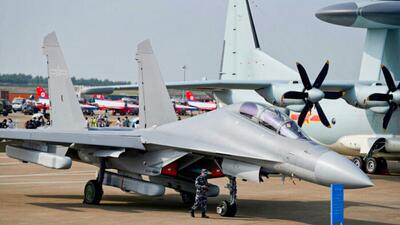
"The China threat is the longer-term strategic threat..."
Amid Ukraine War, China Threat Rises
BY TYLER DURDEN
WEDNESDAY, MAR 09, 2022 - 10:00 PM
Authored by Frank Fang via The Epoch Times,
As the world focuses on Russia’s continued invasion of Ukraine—along with the climbing civilian death toll and growing refugee crisis—it’s also witnessing a seismic shift in the global geopolitical landscape.
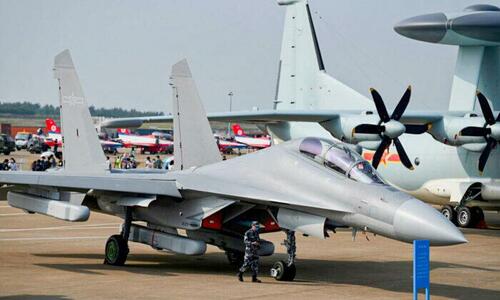
A military personnel walks past Shenyang Aircraft Corporation's J-16 multirole strike fighter for the People's Liberation Army Air Force (PLAAF) at the 13th China International Aviation and Aerospace Exhibition in Zhuhai, southern China's Guangdong Province on Sept. 28, 2021. (NOEL CELIS/AFP via Getty Images)
Street Bounces, After Selloff Fed Boosts Liquidity
Russia’s actions in Europe have drawn the eyes of the United States and its allies to the West, as they did in decades past, as meanwhile a larger, more formidable force gathers strength in the East, setting its sights on dominating the Indo-Pacific, and then the world.
For decades, the Chinese communist regime has been building its economic and military might so as to replace the United States as the sole superpower by mid-century. With the regime acknowledged by the U.S. administration as America’s primary threat, posing its “greatest geopolitical test,” Washington has been shifting its resources and energy to the Indo-Pacific region in a bid to check Beijing’s rising influence there.
But the escalating war in Eastern Europe is frustrating Washington’s plans, analysts say, even as the Biden administration insists that it can focus on two theaters—Europe and the Indo-Pacific—at the same time.
“The revival of Cold War 1.0 (Moscow–Washington) taking oxygen majorly away from Cold War 2.0 (Beijing–Washington) is a blunder of historical proportions where the democracies are concerned,” Madhav Nalapat, a strategic analyst and vice chair of the India-based Manipal Advanced Research Group, recently told The Epoch Times.
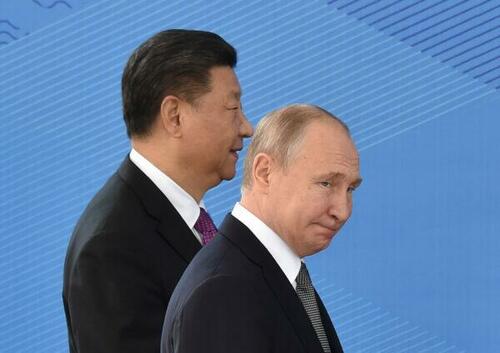
Russian President Vladimir Putin and Chinese leader Xi Jinping walk as they attend a meeting of the Shanghai Cooperation Organisation Council of Heads of State in Bishkek on June 14, 2019. (Vyacheslav Oseledko/AFP via Getty Images)Nalapat pinned the blame on Washington and NATO for engaging in a series of strategic missteps that he believed culminated in Russia’s invasion of Ukraine.
Brandon Weichert, geopolitical analyst and author of “Winning Space: How America Remains a Superpower,” held the same view, chiding the Biden administration for choosing to return to “pre-Trump normal” with respect to its relations with Russia—that is, by adopting a policy that sought to “contain Russia” and put pressure on Moscow to be “a good democracy with human rights.”
“Vladimir Putin believes that no more deals can be made with the United States, certainly not with neoliberal and neoconservative elites like Joe Biden, or even Lindsey Graham, running the show in Washington,” he said.
“Under [former President Donald] Trump, this was our last exit ramp, before a real catastrophe happening”—the buildup of the Sino–Russian alliance, he said.
The recent approach has effectively pushed Russian President Vladimir Putin into a corner, according to Weichert. And with no else to turn to, Putin chose to side with the Chinese Communist Party.
But this outcome, he said, could have been averted. While Russa is by no means an ideal or natural partner, given the country’s human rights and military record, Weichert said, it has to be acknowledged that Moscow could have helped the U.S. administration in providing a valuable counterweight to Beijing.
“If we could get the right leader in charge, we would be able to possibly break Russia away from China, because ultimately, Russia still doesn’t trust China,” he said. “And ultimately, Russia would prefer to continue to do business with the Europeans, and to still have positive relations, at least in space, and on nuclear matters with the Americans.”
As this didn’t occur, Russia and China are deepening their relationship, in ways previously unseen. Two weeks before the invasion, as Russia was drawing heavy international criticism for its plans to attack Ukraine, Putin and Xi proclaimed a “no limits” partnership, a bilateral relationship “superior to political and military alliances of the Cold War era.”
This burgeoning partnership is worrisome, Weichert said, because the two countries decided not just to cooperate economically and militarily, but to work together in a “general ideological way.”
“They’re starting to look at the ideological component—the component of autocracy, the concept of multipolarity—having many different powers in the world, as opposed to only the United States running the world, with spheres of influence,” he said.
“That is something that Russia and the Chinese leadership for 30 years have talked about, but they never actually shared or coordinated with one another. Now we see the beginnings of that.”
The White House didn’t immediately respond to a request for comment.
Distrustful Partners
On the opening day of the Winter Olympics, Putin met with Xi in Beijing, displaying a united front against growing international condemnation of their respective regimes.
According to a 5,000-word joint statement, the two leaders said there would be “no ‘forbidden’ areas of cooperation” between their countries.
The statement also revealed that Putin and Xi had decided to support each other geopolitically: China denounced the enlargement of NATO, a key justification for Russia’s invasion, while Moscow backed Beijing’s claim that self-governing Taiwan was a part of China.
The new partnership is, in fact, many years in the making, particularly after 2014 when Russia was hit with multiple sanctions over its annexation of Crimea. Since then, bilateral trade has gone up more than 50 percent and now China is the top destination of Russian exports.
Russia is China’s second-biggest oil supplier behind Saudi Arabia, accounting for 15.5 percent of China’s total imports in 2021. Russia is also a major supplier of gas and coal to China.
While the bond between Russia and China might appear strong on the surface, Weichert said that Putin must be fully aware of what the partnership would entail.
“What’s going on now is, Russia under Putin is very aware that they are relatively weaker than China. And the closer that Putin gets to China, the more likely he’s going to become a second player—second fiddle to Xi Jinping’s juggernaut in China,” he said.
“The last thing he wants to do is go from being sort of pushed around by the West to then switching over to the Chinese, and suddenly being subordinated or assimilated by China into their new growing high-tech empire of Eurasia.”
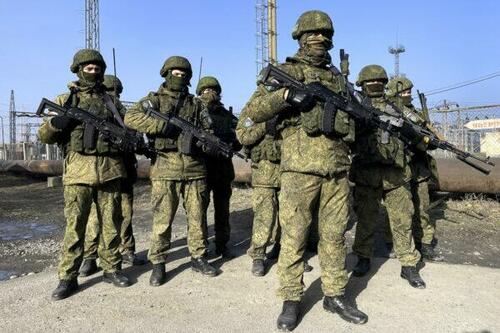
Russian peacekeepers of the Collective Security Treaty Organization guard an area in Kazakhstan, on Jan. 12, 2022. (Russian Defense Ministry Press Service via AP)In Weichart’s view, Putin has already tried to assert his dominance over Xi, when the Russian president decided to deploy Russian troops into Kazakhstan as peacekeepers in January.
“I think Putin was trying to say, ‘Hey, Xi, we can work together to trade in Central Asia, but I’m the alpha male here, you work with me, not the other way around,’” he said.
China has dramatically dialed up its influence in Central Asia—a region of former Soviet states where Russia holds much sway—in recent years, as Kazakhstan, Kyrgyzstan, Tajikistan, and Uzbekistan have all signed up to China’s Belt and Road Initiative (BRI, also known as One Belt, One Road).
Beijing rolled out the initiative in 2013 to increase its economic and political clout worldwide by building up trade routes linking China, Southeast Asia, Central Asia, Africa, Europe, and Latin America.
“The allies—China and Russia—are constantly going to be looking over each other’s shoulder even when they’re working together to push back American power projection, in Eurasia first and eventually throughout the world,” he said.
Bigger Threat
The most important factor making the Chinese regime a bigger threat than Russia is the size of the Chinese economy, according to Weichert.
“The China threat is the longer-term strategic threat,” he said. “They’re the ones with the greater technology base. They’re the ones whose economy is right behind the size of America’s.”
China is currently the world’s second-largest economy, trailing the United States. According to 2020 data from the World Bank, China’s economy is about 10 times bigger than Russia’s.
The economic power behind the Chinese communist regime thus allows it to do things that Russia cannot, Anders Corr, principal at the New York-based political consultancy firm Corr Analytics, said.
“China uses that economic power not only to build its military,” Corr, who is also a contributor to The Epoch Times, said. “China is able to use that economic power for political influence around the world.
“So essentially, they’re able to bribe politicians, whether that’s directly by giving them bags of cash, or they’re able to bribe them through promises of aids, loans, and cheap loans.”
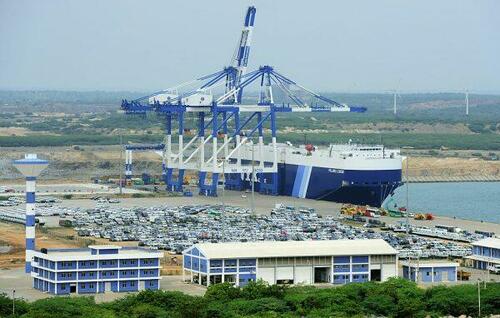
A general view of the port facility at Hambantota, Sri Lanka, on Feb. 10, 2015. (Lakruwan WanniarachchiAFP/Getty Images)Western officials and experts have criticized China for exporting corruption through BRI or sustaining corruption in BRI-participating nations. The program also has been described as a form of “debt-trap diplomacy,” which saddles developing countries with unsustainable debt burdens, potentially forcing those nations to transfer strategic assets to Beijing.
China Merchants Port Holdings is now running Sri Lanka’s Hambantota port on a 99-year lease, after the South Asian country was unable to service a $1.4 billion loan for its construction in 2017. Seizing the port has allowed Beijing to gain a key foothold in the Indian Ocean.
Critically, the Chinese regime has a unique advantage in the West arising from its sprawling business ties between Western firms, eager to gain a greater pie of the lucrative Chinese market. As a result, Beijing has been able to build clout in the United States and elsewhere, through its own elites—a strategy known as “elite capture.”
“The Chinese Communist Party has done a great job of basically enlisting the elites of the free world. And so a lot of their wealth is tied up in this relationship with China,” Robert Spalding, a senior fellow at the Hudson Institute and retired Air Force brigadier general, told The Epoch Times.
The regime, “by entwining themselves into the fortunes of the elites,” is then able to “push on them and lean on them,” Spalding said. “This is a problem.”
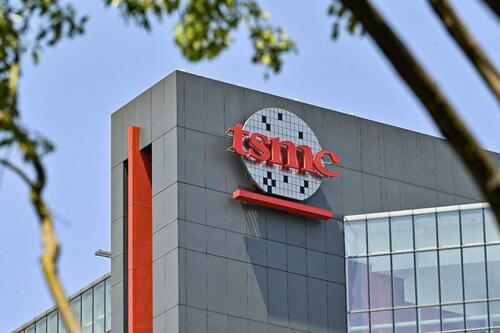
A factory of Taiwanese semiconductors manufacturer TSMC at Central Taiwan Science Park in Taichung, Taiwan on March 25, 2021. (Sam Yeh/AFP via Getty Images)Taiwan
The Chinese regime’s other threat, which has worldwide implications, is its desire to take over Taiwan, a de facto entity Beijing claims as part of its territory. The island, home to the world’s largest contract chipmaker TSMC, produces about 63 percent of the world’s semiconductor chips, compared to the 12 percent produced by U.S. chipmakers.
Seizing Taiwan would give China control over the island’s chip manufacturing facilities, potentially allowing Beijing to block other nations from buying the critical technology, which is used to power nearly all electronics from cars to missile systems.
“I think China does definitely have its eye on Taiwan. China will be watching what we do, what Russia does in terms of Ukraine as a lesson that it can take home, in terms of its strategy for Taiwan,” Corr said.
“So I think that if we don’t truly punish Russia in a serious way, we will be giving the green light to China to do the same thing to Taiwan.”
Complicit?
As the Ukraine war drags on, Beijing has repeatedly refused to condemn Russia for its aggression, nor label the attack as an “invasion.” It has also rejected joining the West in imposing financial sanctions against Moscow, describing such a move as lacking legal basis.
Such signs of tacit support have caused some to suggest that Beijing had played a larger role than it appeared on the surface in facilitating Russia’s assault.
“Moscow is so much under the thumb of Beijing,” Corr said, adding “which makes me think that in the current case of the invasion of Ukraine, it is so not in the interests of Russia … to make itself an international pariah and focus of the world’s attention.”
He added: “That makes me suspect that it’s possible Beijing had asked Putin to do this or encouraged Putin to do this in some way. So I think we have to consider that as a possibility.”
Indeed, there is piling evidence that Beijing knew of Moscow’s military plans prior to the invasion and had discussed it with Russian officials.
Senior Biden administration officials shared intelligence with top Chinese officials about the Russian military buildup near Ukraine, according to a Feb. 25 report by The New York Times. The intelligence-sharing lasted more than three months, the report said, citing unnamed U.S. officials. But China ignored the repeated U.S. warnings, and instead turned around to tell Moscow what it had learned from Americans and that it wouldn’t interfere with Russia’s plans.
A Western intelligence report, first covered by The New York Times on March 2, indicated that senior Chinese officials asked senior Russian officials to wait until after the end of the 2022 Winter Games before invading Ukraine. The request happened in early February, but it is unclear from the report whether Xi and Putin talked about it during their meeting in Beijing.
Regardless of the level of Chinese involvement, the invasion ultimately served to achieve Beijing’s aims, noted lawmakers and experts.
Rep. Ken Buck (R-Colo.) recently told EpochTV’s “China Insider” program that the invasion was a “distraction,” shifting U.S. attention away from the Pacific.
“In China’s view, it serves as a way of siphoning off resources that can be used in other areas,” Buck said.
For Corr, the invasion would distract people from paying attention to China’s problems, such as the genocide against Uyghurs and other Muslim minorities in China’s far-western Xinjiang region and the expansion of artificial islands in the South China Sea.
Gary Bai contributed to this article.
Amid Ukraine War, China Threat Rises | ZeroHedge
If you're gonna fight, fight like you're the third monkey on the ramp to Noah's Ark... and brother its starting to rain. Join our efforts to Secure America's Borders and End Illegal Immigration by Joining ALIPAC's E-Mail Alerts network (CLICK HERE)
Similar Threads
-
Graham Calls On Trump "To Use Emergency Powers" To Build Wall "I hope it works"
By Airbornesapper07 in forum General DiscussionReplies: 9Last Post: 01-11-2019, 03:18 PM -
Obama Calls Trump "Tin-Pot Dictator", Takes Credit For "Economic Miracles"
By Airbornesapper07 in forum Other Topics News and IssuesReplies: 4Last Post: 10-23-2018, 11:24 PM -
Texas Antifa group calls for the formation of a "Red Army", pledges to "Annihilate" t
By ALIPAC in forum Other Topics News and IssuesReplies: 0Last Post: 08-21-2018, 04:27 PM -
BS/PROPAGANDA ALERT!"100% False" "FBI Foils Russia Sale of Nuclear Bomb to ISIS"
By WalkerStephens in forum Other Topics News and IssuesReplies: 0Last Post: 10-11-2015, 11:40 PM -
Putin Has Nuclear Economic Bomb - "HELL OF A MESS"
By HAPPY2BME in forum General DiscussionReplies: 4Last Post: 03-29-2014, 10:11 PM


 LinkBack URL
LinkBack URL About LinkBacks
About LinkBacks




 Reply With Quote
Reply With Quote


1,300 Migrants swarm NYC’s City Hall over false rumor of green...
04-25-2024, 07:27 AM in General Discussion